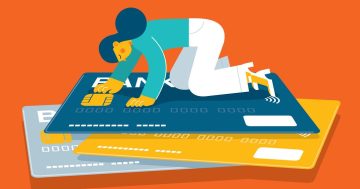
Happiness could have more to do with your financial position than you think.
If you’re looking for a way to make ‘happiness’ your theme for 2018, gaining financial stability is a great place to start. While it’s been a long-accepted belief for most of us that money can’t buy happiness, that may not be entirely true.
In the most recent Stress and Wellbeing report developed by the Australian Psychological Society, financial issues were identified as the top cause of stress over the five years included in the study.
This sentiment is echoed in an article titled Money, Happiness and Financial Stability penned by acclaimed Clinical Psychiatrist Dr George Simon, which suggests that while our level of happiness is dictated by a myriad of factors, our economic situation plays a big role in how happy we are.
The article, which is based on a study titled Happiness and the Persistence of Income Shocks, suggests our levels of happiness don’t necessarily depend on generous short-term earnings or one-off cash windfalls, but rather with how we view our longer-term financial security. While I’m sure none of us would dislike receiving a big pay packet or an unexpected lump-sum of money, it’s the knowledge that we’re steadily improving our level of financial security over time that will pay a far bigger contribution to our overall feeling of happiness.
However, there is a catch. If efforts to improve your financial security require you to work harder, whether it be through working longer hours or by taking on more stress, there is the potential to end up unhappier due to the higher personal costs.
So how can you improve your overall financial security without paying the toll in your personal life? I spoke to Andrew Sykes from RSM in Canberra who suggested the following three tips to help you improve your financial security, without having to sacrifice your quality of life.
- Reduce debt
While it usually carries a negative connotation, debt isn’t always a bad thing. The most important thing to know about debt is how to distinguish ‘good debt’ from ‘bad debt’.
If you have debt that is tied to an asset or investment that is likely to grow in value or generate income for you (like a mortgage on a property), it can be considered as ‘good debt’.
On the other hand, ‘bad debt’ which isn’t going to generate any money for you in the long term (like credit card debt) is the one you need to watch out for. Debt on things like credit cards typically also comes with a very high-interest rate, meaning your hard-earned cash is essentially going down the drain each month.
The first step to taking financial control is to tackle your bad debts head-on. Try setting yourself a commitment for 2018 to avoid making any more ‘bad debt’ purchases until you’ve paid off what you currently owe. Then going forward, ensure you pay off any new purchases you make within the same month so you don’t have to pay unnecessary interest.
- Increase your savings
Once you’ve put a strategy in place to reduce your debt, you can start thinking about how you can build up your savings.
There are plenty of schools of thought out there about how to save money, but a simple one that can help you save without even noticing it is by connecting a micro-savings or round-up tool to your debit card.
The tool which is offered by some banks works by rounding up every purchase you make on your debit card to an amount you specify, before depositing it into a higher interest savings account. For example, if you choose to round up your purchases to the nearest dollar and you buy your daily coffee for $3.50, after 12 months, you’ll have put away an extra $182 into your savings just from your coffee purchases alone.
- Start investing
If you like the idea of the round-up savings tools, then you’re going to love this…
There is now a range of micro-investing apps on the market like; this one called Acorns, which operate in a similar way to round-up savings tools, but take the concept one step further by automatically investing whatever cash you save to earn you even more money!
If you’ve never invested before, it may seem a little scary trying to work out if it’s a good move to put your hard-earned cash into shares, property or the cryptocurrencies that are on the tip of everyone’s tongue, but with a micro-investing app, all the hard work choosing the best investments is done for you.
All you need to do is set up your account and choose the investment strategy you want to follow (from conservative, moderately conservative, moderate, moderately aggressive or aggressive), then they’ll take care of the rest for a small monthly fee.
While these strategies can get you on the right track to becoming financially secure, achieving long-term financial security will require a shift in thinking to ensure you continually pay attention to your spending habits and steer clear of spending on things that won’t generate any return for you.
While we don’t want to give up all the little luxuries we’ve come to enjoy in life, making a few small changes can go a long way in the long term, both in the financial and happiness department.
This is a sponsored article, though all opinions are the author’s own. For more information on paid content, see our sponsored content policy.




















